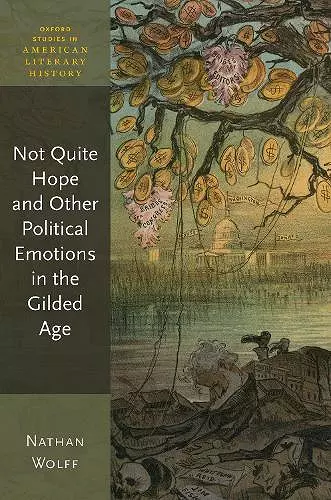Not Quite Hope and Other Political Emotions in the Gilded Age
Format:Hardback
Publisher:Oxford University Press
Published:20th Dec '18
Currently unavailable, and unfortunately no date known when it will be back

Not Quite Hope and Other Political Emotions in the Gilded Age argues that late nineteenth-century US fiction grapples with and helps to conceptualize the disagreeable feelings that are both a threat to citizens' agency and an inescapable part of the emotional life of democracy--then as now. In detailing the corruption and venality for which the period remains known, authors including Mark Twain, Harriet Beecher Stowe, Henry Adams, and Helen Hunt Jackson evoked the depressing inefficacy of reform, the lunatic passions of the mob, and the revolting appetites of lobbyists and office seekers. Readers and critics of these Washington novels, historical romances, and satiric romans à clef have denounced these books' fiercely negative tone, seeing it as a sign of cynicism and elitism. Not Quite Hope argues, in contrast, that their distrust of politics is coupled with an intense investment in it: not quite apathy, but not quite hope. Chapters examine both common and idiosyncratic forms of political emotion, including 'crazy love', disgust, cynicism, 'election fatigue', and the myriad feelings of hatred and suspicion provoked by the figure of the hypocrite. In so doing, the book corrects critics' too-narrow focus on 'sympathy' as the American novel's model political emotion. We think of reform novels as fostering feeling for fellow citizens or for specific causes. This volume argues that Gilded Age fiction refocuses attention on the unstable emotions that continue to shape our relation to politics as such.
Full of splendid insight and erudition, Not Quite Hope and Other Political Emotions in the Gilded Age offers a striking new way to understand the literature of that raucous era. Tracing the negative emotions authors associated with the institutions of American politics, Nathan Wolff shows how disgust, depression, and cynicism can still express an undeclared refusal to passively accept democracy's failings and can become the ground for new political desires and negotiations. Wolff has written a timely and truly accomplished book. * Nancy Bentley, Donald T. Regan Professor of English, University of Pennsylvania *
What better time than now to encounter a book that contends so scrupulously with "an aversive attachment to politics" in the American grain? With great theoretical agility -- and through acute and vividly counterintuitive readings of post-bellum figures like Twain, Stowe, DuBois, and Helen Hunt Jackson -- Nathan Wolff expands our conceptual vocabulary for thinking about political emotion, tuning us to affects that do not parse especially easily in the familiar grammars of sentimentality but that are not, his readings show, quite so "anti-democratic" as our histories of Gilded Age fiction have led us to believe. Not Quite Hope is an exemplary work of literary historicism, affect theory, and political imagination. * Peter Coviello, Professor of English, University of Illinois-Chicago *
What does democracy feel like? Nathan Wolff's superb study lays bare the complex ambivalences of political emotion during America's first Gilded Age, a period with revealing correspondences to our own. Probing a diffuse set of "almost-always-negative feelings" that surrounded political activity during this anxious era -- agitation, madness, repulsion, depression, suspicion, cynicism, and exhaustion -- Not Quite Hope shows convincingly how the postbellum political novel yearned to engage with institutional democracy even as it recoiled from it. An essential book for understanding political affect both then and now. * William Gleason, Hughes-Rogers Professor of English and American Studies, Princeton University *
ISBN: 9780198831693
Dimensions: 242mm x 164mm x 22mm
Weight: 518g
240 pages